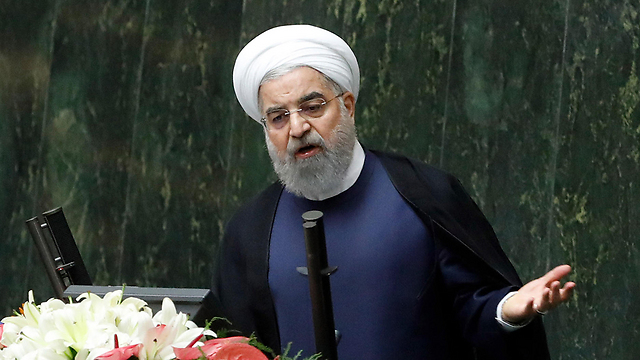Op-ed: Turning a country into part of the US-run global economic system has often led to dramatic changes in that country’s worldview. While economic prosperity likely won’t change Iran completely, what are the alternatives?
Alongside the dramatic drop in oil prices, the agreement with Iran was one of the most important strategic achievements of the Obama administration.
Just a reminder: The agreement followed the success of the Western sanctions policy against Iran. The fact that Iran gave in to Western pressure shouldn’t be taken for granted. North Korea has been suffering for years from much more serious sanctions and from almost total international isolation, yet this hasn’t made Pyongyang give up its nuclear program.
On the contrary. As we all know, the more they are oppressed, the more they multiply and expand. In Western terms at least, North Korea is an irrational country, which fails to respond to pressure. Not Iran. Despite being led by religious zealots, its willingness to give in to the Western dictation—and there was definitely a dictation here—and halt its nuclear program indicates that it does not ignore pragmatic considerations.

Iran’s official ideology was that the United States is the “great Satan.” Supreme Leader Ali Khamenei talks about the West in general, and about the US and Israel in particular, with hatred and disgust. Nevertheless, in spite of the religious and cultural reasons, the supreme leader approved the agreement, with an echoing gnashing of teeth—an agreement which he saw as a blatant interference in the Islamic Republic’s internal affairs.
This surrender to the Western dictation didn’t come at a time of collapse. While the Iranian economy did suffer, the Islamic Republic was far from breaking down. Other religious groups—Israel’s Haredim, for example—are willing to pay an immensely heavier economic and social price for their principles. Iran gave in because it believed its economic considerations were more important than ideology.
Former US President Barack Obama and the rest of the leaders who signed the nuclear agreement understood this signal and acted accordingly. Since World War II, the greatest Western successes haven’t taken place in the battlefield, where America’s achievements have actually been limited. Apart from partial success in Korea, the big wars waged by the US since the 1950s (in Vietnam, in Iraq and in Afghanistan) ended in failure despite its absolute military supremacy, at least theoretically. Its successes were thanks to the economy.
Turning a country into part of the global economic system, which is run by the US, has often led to dramatic changes in that country’s worldview. What the American Marines failed to accomplish in Vietnam was accomplished by the country’s integration in the global economic system (which has clear ideological elements).
Vietnam, formerly the West’s bitter enemy, is today a friendly country that maintains strong trade relations with the US. There’s no military threat which would have caused the revolution undergone by China in recent decades, a revolution which turned it from a fanatical communist country into a thriving capitalist economy. Similar processes took place in the communist bloc: It didn’t collapse because of NATO; it collapsed because of the economy.
This policy basically began with the most brilliant diplomatic move ever performed by the US—the Marshall Plan. Instead of punishing the defeated countries after their bitter struggle in World War II, the US gave them billions in economic support. It seemed to contradict logic and justice, but the result was that the West—which included anti-democratic and racist forces, as well as ideological and religious fanaticism—became democratic and liberal.
Similar moves began when fascist and religious countries like Spain and Portugal, and fanatically religious countries like Ireland, were admitted into the European Union. Spain, Portugal and Ireland are today liberal democracies. It didn’t happen through force.
Does Iran fit this pattern? That’s a difficult question. Unlike most European countries, which are willing to recognize the US as the world’s hegemonic power, Iran sees itself as a regional power whose interests don’t match the American interests. It’s also a religious country afraid of the cultural influences of Westernization.
Economic prosperity likely won’t change Iran from one extreme to the other (although we should remember that the country is going through internal processes of a “positive” change, as far as the West is concerned). On the other hand, we should ask ourselves what are the alternatives.
It’s hard to assume that the US will succeed in conquering Iran (as the price is much too heavy). Throwing it out of the game will push it toward a North Korean position, which the West lacks effective tools to deal with. The negotiations on the terms of the agreement must continue. Canceling it would be a mistake.
As reported by Ynetnews
